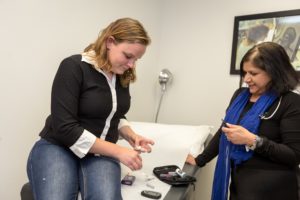
Endo ECHO’s telehealth model has changed one woman’s life.
Twenty-year-old Kaycee May of Portales, New Mexico, is still new to type 1 diabetes (T1D). Yet in the three years since her diagnosis, she’s battled depression, graduated high school, married, and had a baby.
She currently works at a day care center while pursuing a college degree in early childhood education. Despite having so much on her plate, Kaycee says she’s optimistic about her future. But, she adds, she probably wouldn’t be where she is without the support of a program called Endo ECHO that has helped her address not only diabetes but other life challenges.

Kaycee May and her family have benefitted from Project ECHOs local diabetes care program.
Funding from the Helmsley Charitable Trust’s T1D Program helped the University of New Mexico Health Sciences Center launch Endo ECHO to address the widespread need for greater access to complex diabetes care. The innovative tele-mentoring model links community-based clinicians with specialists at university medical centers to provide better care for people living in rural or underserved areas.
“I probably would not have graduated from high school without Endo ECHO,” Kaycee says. “I probably would have stopped taking care of myself and just thrown my hands in the air.”
When Kaycee got her diagnosis at age 17, her blood-sugar levels were so high that her doctors feared she might fall into a coma. They sent her to a hospital more than 100 miles away in Lubbock, Texas, where she wound up staying for a week.
Afterward, she travelled to Lubbock every month to see her doctor – a two-hour drive each way for a 30-minute appointment.
At first, things seemed to be going well and Kaycee’s diabetes was under control.
But about six months after her hospitalization, Kaycee was diagnosed with depression and anxiety, common problems among people who have diabetes. She stopped taking care of herself – and her diabetes began to take over. “I kind of said, ‘What’s the point?’”
Kaycee heard about Endo ECHO from her longtime primary care provider, Neelu Finley, a physician assistant at Roosevelt General Hospital Clinic in Portales. Neelu asked her if she was interested in trying it, and Kaycee agreed.
In Endo ECHO, Kaycee no longer needs to travel to Lubbock for her diabetes care. Instead, she sees Neelu, who, through Endo ECHO, has been specially trained in diabetes and works as part of a team of doctors and other specialists based in Albuquerque to manage Kaycee’s care.
Albuquerque is 230 miles from Portales, but Neelu meets with the Endo ECHO team weekly through a virtual clinic – along with primary care providers from eight other community health centers in New Mexico. These primary care providers review their cases with the specialist team in Albuquerque, discuss challenges, and determine next steps for their patients. This way, instead of patients having to travel hundreds of miles each way to get their complex care needs met, local providers bring specialty care to patients in their own communities.
“Before Endo ECHO, I felt like I had a gigantic burden,” Kaycee says. “I had to take a whole day off from work and school because my appointments usually were in the middle of the day. I lost the money I could have been making from work and I lost time from school.”
The relationship is different, too.
Kaycee says that seeing Neelu is “like going to see a friend instead of just going to see a doctor.” Not only has Neelu taught Kaycee how to better manage T1D, but she’s also helped her navigate the ups and downs of depression. Neelu saw Kaycee through her pregnancy, coordinating her prenatal care with the clinic’s maternity services. When her depression and anxiety worsened, Neelu referred her to a counselor, who Kaycee says helped her a great deal during a difficult time.
Kaycee gave birth to daughter Jaymie in July 2016. Because of problems with her T1D, she was induced a month early, but both mother and daughter are doing fine. Kaycee’s husband Daniel has been a great support; Kaycee calls him her “personal diabetes coach.”
In fact, she says, her entire family has been very supportive. However, no one else in her family has T1D. “They didn’t know what I was going through,” she says. “They just didn’t understand the fear that was in my head and how worried I was all the time – not just about myself but about my daughter.”
Endo ECHO made everything “feel more manageable.” Now, says Kaycee, her diabetes doesn’t control her life. “I’ve kind of accepted it as part of my life, but it’s not running my life. It’s like another job.”
Kaycee has recommended Endo ECHO to other young people living with T1D – young people, who, just like her, were traveling to Lubbock for their care. For Kaycee May, those days are over.